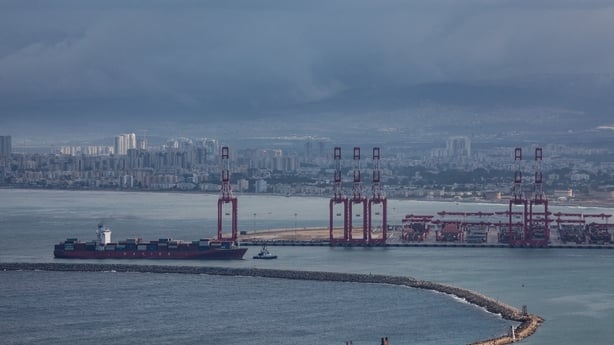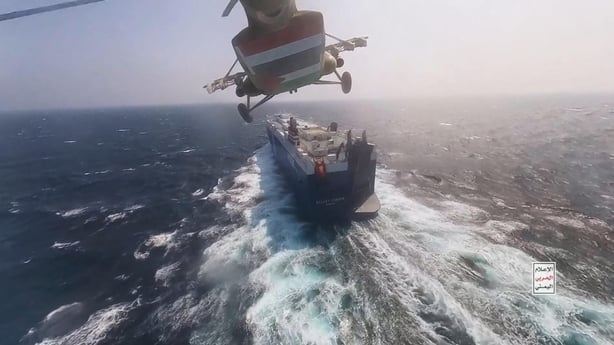Maersk, one of the world's largest shipping companies, has said it is suspending its vessels' passage through a key Red Sea strait following attacks by Yemeni rebels on merchant ships.
A spokesperson for the Danish shipping company said they will now send their vessels on a detour around Africa until further notice.
The Iran-aligned Houthis rebels, who control much of Yemen but are not recognised internationally, say they are targeting shipping to pressure Israel during its two-month-old war with Hamas in Gaza.
"Following the near-miss incident involving 'Maersk Gibraltar' yesterday and yet another attack on a container vessel today, we have instructed all Maersk vessels in the area bound to pass through the Bab al-Mandab Strait to pause their journey until further notice," Maersk said in a statement.

Yesterday, Maersk said its vessel ‘Maersk Gibraltar’ was targeted by a missile while travelling from Salalah, Oman, to Jeddah, Saudi Arabia and that the crew and vessel were reported safe.
Earlier today, Maersk denied a claim by Yemen's Houthi rebels that the militia had struck a Maersk vessel sailing towards Israel.
"The vessel was not hit," a Maersk spokesperson told Reuters in an emailed statement following the Houthi claim.
The Houthis had claimed they carried out a military operation against a Maersk container vessel, directly hitting it with a drone. The Houthis, who made the claim in a statement, did not release any evidence.
Maersk said the company was deeply concerned about the highly escalated security situation in the southern Red Sea and Gulf of Aden.
"The recent attacks on commercial vessels in the area are alarming and pose a significant threat to the safety and security of seafarers," it wrote in the statement.

Earlier today, US defence official, speaking on condition of anonymity, told AFP that they "are aware that something launched from a Houthi-controlled region of Yemen struck this vessel which was damaged, and there was a report of a fire."
The official identified the ship as the Liberia-flagged Al-Jasrah, a 370-metre container ship built in 2016.
Later in the day during a pro-Palestinian rally in the Yemeni capital, Sanaa, the rebels said they attacked two other ships in the area, as crowds shouted "death to Israel."
"Container ships MSC PALATIUM and MSC ALANYA were targeted by two naval missiles as they were heading toward the Israeli entity," Houthi military spokesman Yahya Saree said in a broadcast on the rebels' television channel.
Speaking in Tel Aviv, US National Security Advisor Jake Sullivan said: "While the Houthis are pulling the trigger, so to speak, they're being handed the gun by Iran."
Private intelligence firm Ambrey said the Al-Jasrah, owned by German transport company Hapag-Lloyd, "sustained physical damage from an aerial attack" north of the Yemeni coastal city of Mokha.
"The projectile reportedly hit the port side of the vessel and one container fell overboard due to the impact. The projectile caused a fire on deck" that was reported over radio, Ambrey said.
The Houthis have said they will target any ships travelling to Israel irrespective of their nationality, and are now launching regular attacks, although they are mostly unsuccessful.
A Hapag-Lloyd spokesman told AFP: "There has been an attack on one of our ships."
The ship was en route from the Greek port of Piraeus to Singapore. There were no casualties and the ship is now travelling on towards its destination, he added.
'Threat to commercial shipping'
Mr Sullivan, speaking on a visit to Tel Aviv, said the Houthis were threatening freedom of navigation in the Red Sea, which is vital for oil and goods shipments.
"The United States is working with the international community, with partners from the region and from all over the world to deal with this threat," he told reporters.
The attack occurred near Bab al-Mandab, the narrow strait between Yemen and northeast Africa through which much of global commerce flows.
The area leads to the Red Sea, Israel's southern port facilities, and the Suez Canal, making it part of a strategic route for Gulf oil and natural gas shipments.
Attacks on ships in the Red Sea have led to rising insurance premiums for vessels in the area, Bloomberg news reported.
While warships passing through the Red Sea are well equipped and can retaliate, commercial vessels do not have the same protections.
Crews under fire by heavy weapons typically abandon the bridge and control their vessels remotely from an armoured citadel.
The Houthis have declared themselves part of the "axis of resistance" of Iran-affiliated groups and say they are defending the Palestinians from an Israeli onslaught in the Gaza Strip.
The attacks have added to concerns the Israel-Hamas war could spill across the wider region.
Houthis have tried to hijack and capture several ships, succeeding at least once in November. They typically order them to surrender and head to a Yemeni port, and open fire if they do not comply.
US, French and British warships are patrolling the area and have shot several missiles out of the sky.
Mohammed Al-Basha, a senior Middle East analyst for the US-based Navanti Group, said the attack on the Al-Jasrah showed that ships carrying goods for Israel or other nations could be potential targets.
"A significant concern stems from the Houthis' potential inability to distinguish between different vessels, leading to worries about accidental targeting, including warships," he told AFP.

